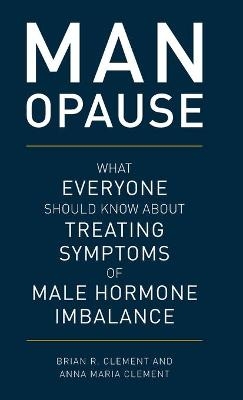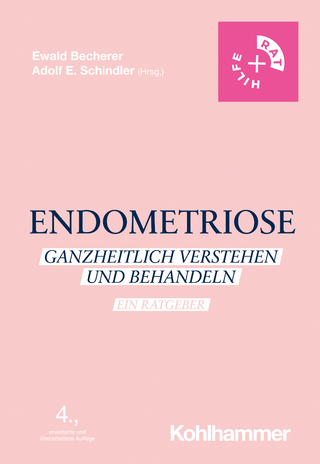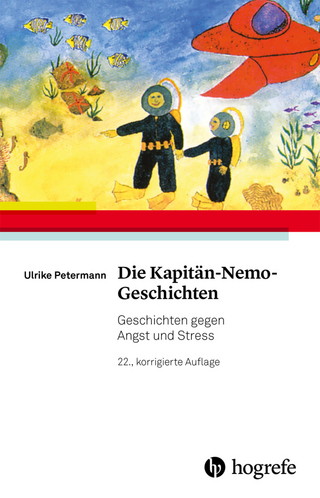
MAN-opause
Rowman & Littlefield (Verlag)
978-1-5381-2934-0 (ISBN)
This book is a man’s education manual about the health effects of hormone imbalance, but just as importantly, it’s a must-read for the women in their life, since it is often the women who inspire and coax men to break through their denial and seek help when they encounter health challenges.
That cluster of mid-life hormonal declines, characterizing the medical term Andropause, fits the definition of a significant life challenge, one which nearly all men will eventually face, yet very few of them even realize the condition exists, much less that the vexing symptoms they experience can be remedied.
Male menopause (MAN-opause) is a little reported and little understood phenomenon which, as this book shows, may be affecting men at younger ages and for far longer in life than ever recorded before.
Using the latest medical science findings, MAN-opause explains in understandable language how any man---with or without a woman’s participation--can take proactive steps, at any stage of life, to neutralize the impact of Andropause and its wide range of debilitating symptoms.
Brian Clement, PhD, NMD, and LN, and his wife, Anna Maria Clement, PhD, NMD, LN, have spearheaded the international progressive health movement for more than three and one-half decades as Directors of the renowned Hippocrates Health Institute, in West Palm Beach, Florida, the world’s foremost complementary residential health center, which has served more than a half-million clients since its founding. Spa Magazine calls Hippocrates “the number one wellness spa in the world.” Over the last half century, this couple and their team of healthcare professionals have pioneered clinical research and training in disease prevention using hundreds of thousands of participants who provided volumes of data, giving the Clements a privileged insight into the lifestyle required to prevent disease, enhance longevity, and maintain vitality. Their findings have provided the basis for Hippocrates progressive, state-of-the-art treatments and programs for health maintenance and recovery–––their Life Transformation Program. In addition to his research studies, the Clements conduct many dozens of conferences before tens of thousands of people worldwide each year, educating on how to attain health and longevity, and giving humanity a roadmap for enriching their lives. Individually and together they have authored more than 20 books, including: Living Foods for Optimum Health, 1998, Harmony. Hippocrates LifeForce, 2007, Healthy Living Publications (Cornell University nutritional biochemist Dr. Colin Campbell called this book, in his Preface to it, “One of the most important books ever written on nutrition.” Supplements Exposed, 2009, New Page Books. 7 Keys to Lifelong Sexual Vitality, 2012, New World Library.
Introduction: Who In Your Life Has Irritable Male Syndrome?
Chapter One: Start With This Andropause Assessment
Which of these ‘cluster’ of 12 symptoms describe you? Bone Brittleness. Brain ‘Fog’. Breast Growth. Fatigue. Hair Thinning. Mood Changes. Muscle Mass Deteriorates. Prostate Enlarges. Sexual Dysfunction. Sleep Quality Declines. Stress Overwhelms. Weight Gain.
Chapter Two: How Andropause Impacts Long Term Male Health
Chapter Summary: A brief explainer on the role that hormones play in life quality, the stages of life (age ranges) during which hormones develop and decline, the body organs involved, how male hormones have daily and monthly cycles, and a short history of endocrinology research findings and evolving theories about aging and the relative impact of individual genetics and lifestyle decisions.
An overview of science evidence showing that lower circulating testosterone predicts the development of cardiovascular disease and increases the risk for strokes. Metabolic Syndrome (obesity, high blood pressure, high cholesterol) is another consequence of low T, as is the undermining of cognition and memory, increasing the risk for dementia and Alzheimer’s disease.
Chapter Three: Lifestyle Factors & Toxins Accelerate Aging
Chapter Summary: Andropause can be accelerated, or even triggered, by exposure to endocrine disrupting chemicals in our food supply and from using certain personal care products. We give the latest science findings on the synthetic chemicals to avoid. For example, exposure to a range of pesticides can block male hormones, but so can drinking cow’s milk, which contains residues of 20 or more chemicals, including hormone disruptive chemicals used to treat diseases in both humans and animals. Personal care products for men contain dozens of disrupters, which we will identify.
Statins and other drugs magnify Andropause symptoms, which can be a problem because almost a quarter of all men over 40 years of age are on statin drugs to lower their cholesterol. Cholesterol is one of the building blocks of testosterone, so if you lower your cholesterol too much, you limit the chemical building blocks available for testosterone production.
More testosterone theft from the body occurs from eating too much sugar. Hops used in beer contains estradiol, which interferes with testosterone production. Grapefruit consumption increases estrogen levels and undermine testosterone. Low Vitamin D levels undermine testosterone, as well as other hormones. And don’t overlook the role of nutrient deficiencies, having too little zinc, etc. in your diet. Many more examples will be included and explained as a foundation for understanding treatment options.
Chapter Four: Combating Bone Brittleness
Problem Summary: When bone fractures occur more easily and you are experiencing chronic bone and joint weakness, it may be due to low testosterone levels. This condition could lead to osteoporosis.
Solutions Summary: We present abundant science evidence for the effectiveness of a range of botanicals (plant extracts) and key nutrients that reduce inflammation in the joints, increase bone density, and even repair damage. These range from the botanicals white mulberry, cutch tree, and Chinese skullcap, to the nutrients vitamin D, calcium, zinc, magnesium, and boron. We show how to create a bone disease modifying therapy from combinations of these healing agents.
Chapter Five: Lifting Brain ‘Fog’
Problem Summary: You no longer feel mental sharpness and you display memory lapses. Fuzziness in thinking may be a result of low testosterone during Andropause.
Solutions Summary: Scientists at MIT, in a 2016 clinical trial with older adults showing cognitive impairment, found that magnesium L-threonate supplementation can reverse the symptoms of brain aging and the mental fog caused by andropause. We feature other science evidence for natural solutions to cognitive decline, including the 2016 favorable results of a clinical trial showing the positive effects of testosterone supplementation on men with impaired cognitive functioning.
Chapter Six: Stopping Breast Growth
Problem Summary: A man notices he is growing larger breasts, chest flab from weight gain which may be a consequence of the low testosterone production caused by the Andropause process of aging.
Solutions Summary: High fiber vegetable consumption helps to remove excess estrogen, which is a contributor to breast growth. We identify the highest fiber vegetables. Coupled with dietary intervention, chest tightening exercises will be recommended as part of a resistance training routine for optimal testosterone production.
Chapter Seven: Overcoming Fatigue
Problem Summary: Being tired all the time, no matter how much caffeine is ingested, may signal low testosterone caused by Andropause. As low testosterone affects sleep quality, lethargy and tiredness can be intensified.
Solutions Summary: To rejuvenate energy, not only does testosterone need to be stimulated back to normal levels again, other dietary and supplementation steps need to be taken. Proven natural remedies we discuss to promote testosterone production include Avena sativa, Tribulus terrestris, Fennugreek, and Tongkat Ali. Other treatment steps involve the cessation of consuming foods that cause fatigue, such as abandoning animal protein for plant proteins, cutting out unhealthy fats, and avoid sugars. Chronic stress and lack of quality sleep also depletes energy and must be addressed, as we do in this book, by a holistic program.
Chapter Eight: Slowing Hair Thinning
Problem Summary: A lowering of a man’s testosterone production, beginning about 40 years of age, can produce hair loss that has a visible impact on the head, chest, legs, under the arms, even in the thickness of pubic hair. Simultaneously, he may be growing unwanted hair in the ears and nose.
Solutions Summary: De-stressing and testosterone replacement provide a first line of defense against hair thinning and hair loss, but these steps we detail also help. Low iron and vitamin D levels contribute to hair thinning and should be remedied with supplements. Herbs that help include saw palmetto and ginkgo biloba. Eat foods rich in iron (kale, spinach) and vitamin C (red pepper, broccoli) and vitamin A (sweet potato, kale) and zinc (chickpeas.) Use essential oils like rosemary, spikenard, and peppermint, mixed together and applied to the scalp. Acupuncture has been shown to have positive effects in stimulating blood flow to the scalp.
Chapter Nine: Handling Mood Changes
Problem Summary: If a man becomes irritable for no apparent reason, or releases anger at the slightest provocation, or develops depressive moods, he may be suffering from the hormonal imbalances caused by age-triggered Andropause.
Solutions Summary: When a man comes to a physician complaining of depression, the physician will usually prescribe an anti-depressant, rather than check for low testosterone, which is also a trigger for depression. Readers of this book gain information to help educate their own physicians about proper diagnostic testing to identify and treat andropause symptoms.
Chapter Ten: Rebuilding Muscle Mass
Problem Summary: An average man’s lean body mass decreases by about 10 percent every decade due to aging and lower testosterone production. As a man loses muscle mass, he gains even more body fat, resulting in less circulating testosterone.
Solutions Summary: Doing weight training, and doing it consistently, can increase testosterone production, which builds lean muscle and depletes fat. We provide the science evidence showing which resistance exercises are most effective, how often they need to be done for best results, and what dietary changes need to be made to supplement these results.
Chapter Eleven: Treating Prostate Enlargement
Problem Summary: Andropause contributes to prostate enlargement, which in turn produces an increased urge and frequency to urinate, particularly at night, disrupting sleep quality. As testosterone levels are declining, men’s estrogen hormones are increasing, by as much as 50%, and that in turn, helps the prostate gland to enlarge and trigger benign prostatic hyperplasia. As a man gains weight, particularly in his mid-section, having more fat means testosterone is more quickly converted to estrogen, and a negative cycle ensues.
Solutions Summary: Most studies have found no prostate gland growth after long-term testosterone replacement. As a result, some men with enlarged prostates can qualify for testosterone therapy. Only a physician can make the final decision. It’s also advisable for a physician to monitor prostate health with regular PSA blood tests.
Chapter Twelve: Restoring Male Sexual Function
Problem Summary: Sexual Dysfunction becomes the norm in andropause. A man whose testosterone levels are declining no longer wakes up in the morning with an erection. He will also find that erections take longer and he may no longer feel sexual desire. A man’s penis and scrotum may also undergo shrinkage from testosterone deprivation.
Solutions Summary: For men, sexual health begins with prostate health, but beyond that, in this chapter we will identify the nutrients essential to prostate and sexual health and where to find them in foods and supplements. Zinc is an important one, along with Saw palmetto, pygeum, nettle, and lycopene from red and orange fruits and vegetables. We will also use the latest science evidence to address the controversy about whether testosterone replacement therapy is safe and effective for sexual rejuvenation. Additionally we examine the latest research on natural, more effective alternatives to Viagra and Cialis, one being a ginger-like root from South Asia that, in two human clinical trials in aging men, has been shown to be a safer and faster way to achieve not only erections, but the stimulation of sexual interest and desire.
Ironically, having sex increases a man’s testosterone production. While men with low testosterone may no longer possess the sex drive they ideally want, by engaging in sexual activity anyway, their testosterone levels will increase, and that may help to slowly rejuvenate sexual desire.
Chapter Thirteen: Reversing Sleep Decline
Problem Summary: Insomnia can be due to low testosterone. Because growth hormone is produced during sleep, disturbances of natural sleep rhythms can deplete this hormone, adding to the impact already being caused by Andropause. Both testosterone and growth hormone are released according to a man’s circadian rhythm. If he sacrifices deep sleep, which regulates circadian rhythm, he depletes reserves of testosterone.
Solutions Summary: We present a dozen evidence-based antidotes to sleep deprivation based on natural, non-drug treatments. These range from acupuncture (which has dozens of studies supporting its efficacy) to autogenic training, biofeedback, cognitive behavioral therapy, to dietary changes (eating tart cherries before bedtime boosts natural melatonin) to guided imagery, mindfulness meditation, and other breathing and relaxation techniques.
Chapter Fourteen: Managing Chronic Stress
Problem Summary: Hormone levels are affected by sleep quality and chronic stress. One condition reinforces the other. A chronic release of cortisol, the stress hormone, undermines testosterone levels. If you have excess stress going on in your life, that can raise cortisol or sex hormone-binding globulin (SHBG). That excess cortisol robs the body of the chemical building blocks of testosterone. In addition, SHBG traps free testosterone, making it unavailable for use by the body.
Solutions Summary: Any stress reduction regimen needs to address how chronic stress suppresses the immune system, literally shrinks the human brain, worsens the effects of toxic chemical exposure, and depletes testosterone. Engaging in mindfulness meditation practices and using affirmations both have strong science evidence backing for reducing stress. So does daily doses of laughter from watching humorous movies. Other stress relievers can be found from consuming curcumin, which has been documented to reverse the cellular damage of chronic stress and to exert beneficial anti-depression effects on the brain.
Chapter Fifteen: Reversing Weight Gain
Problem Summary: As a man puts on extra pounds, his testosterone is converted into estrogen. That further reduces his testicle’s ability to produce more testosterone. This cycle is further exacerbated by Andropause lowering testosterone, producing even more fat retention. Attracting visceral fat around the mid-section causes inflammation and insulin resistance; that, in turn, decreases testosterone production. Having excessive body fat can also convert remaining testosterone to estrogen; that causes the development of those unsightly flaps of man breasts. These connections are inter-twined.
Solutions Summary: Cut out the dietary sugar and carbohydrates, because the more of that you eat the more likely you’ll develop insulin resistance or diabetes, conditions which further lowers testosterone. It’s no coincidence that nearly half of men with type 2 diabetes also have low testosterone. One proven byproduct of testosterone replacement therapy is a boost to metabolism, which helps the body to shed extra unwanted pounds.
Chapter Sixteen: More Natural Solutions for Andropause
Solutions Summary: We describe the science evidence for testosterone boosting supplements like Horny Goat Weed, Saw Palmetto, Maca root, DHEA, Pregnenolone, etc. We detail the importance of nutrients such as zinc and vitamin D, once again with an examination of the science backing for safety and effectiveness. Phytoandrogens are plants that stimulate androgen (sex hormone) production in men: examples include ginseng, tribulus, pine pollen, and Nettle root. All will be explained here with easy instructions on use.
Chapter Seventeen: The Case for Bio-Identical Hormone Therapy
Solutions Summary: For men undergoing testosterone replacement therapy, positive effects are usually seen in 3 to 6 weeks. These benefits include: improvements in attitude and sense of well-being, increased mental and physical energy, decreases in anger, irritability, sadness and tiredness, improved sleep quality, improved libido and sexual performance, decline in biochemical markers of bone degradation, increases in lean body mass and a decline in fat, increased muscle strength, and a decreased heart disease risk.
When all other natural solutions fail, there is a ready recourse of treatment involving hormone replacement. We will explain how synthetic hormone replacement differs from bio-identical, and how hormone replacement therapy works in practice. What the most recent science evidence shows about whether testosterone replacement can harm the heart. Does it trigger some types of cancers? Does it reverse anemia and bone brittleness? Readers will learn how to choose the right hormone doctor to address their unique needs. The pros and cons of human growth hormone (HGH) replacement will also be discussed, based on the latest science evidence.
Chapter Eighteen: Andropause Plus Menopause = Couplepause
Solutions Summary: When a couple goes through hormonal changes at the same time, relationship challenges are in set in motion. It isn’t only about being helpful and compassionate in handling each other’s physical needs, it’s a process of adjusting to psychological changes that affect the couple’s ability to peacefully resolve conflict, while supporting each other in taking steps to re-establish a healthy hormonal balance. In this concluding chapter, the couple-related challenges are detailed, case studies from our own experiences with our clientele are examined, and treatment options from behavioral science are explored.
References
Appendix: Resources for finding reputable testosterone testing laboratories and compounding pharmacies.
| Erscheinungsdatum | 10.05.2021 |
|---|---|
| Verlagsort | Lanham, MD |
| Sprache | englisch |
| Maße | 148 x 222 mm |
| Gewicht | 431 g |
| Themenwelt | Sachbuch/Ratgeber ► Gesundheit / Leben / Psychologie ► Krankheiten / Heilverfahren |
| Sachbuch/Ratgeber ► Gesundheit / Leben / Psychologie ► Partnerschaft / Sexualität | |
| ISBN-10 | 1-5381-2934-5 / 1538129345 |
| ISBN-13 | 978-1-5381-2934-0 / 9781538129340 |
| Zustand | Neuware |
| Informationen gemäß Produktsicherheitsverordnung (GPSR) | |
| Haben Sie eine Frage zum Produkt? |
aus dem Bereich


